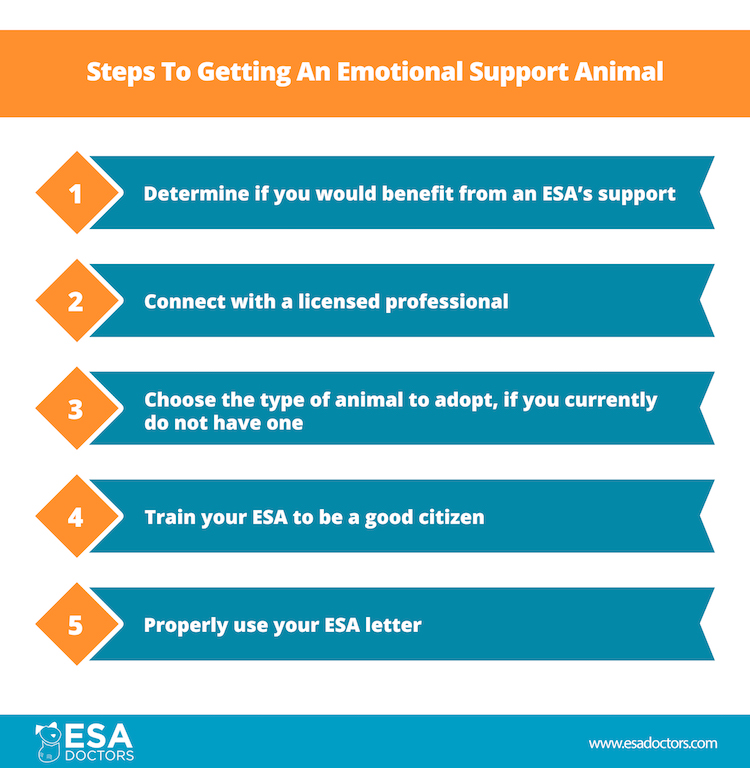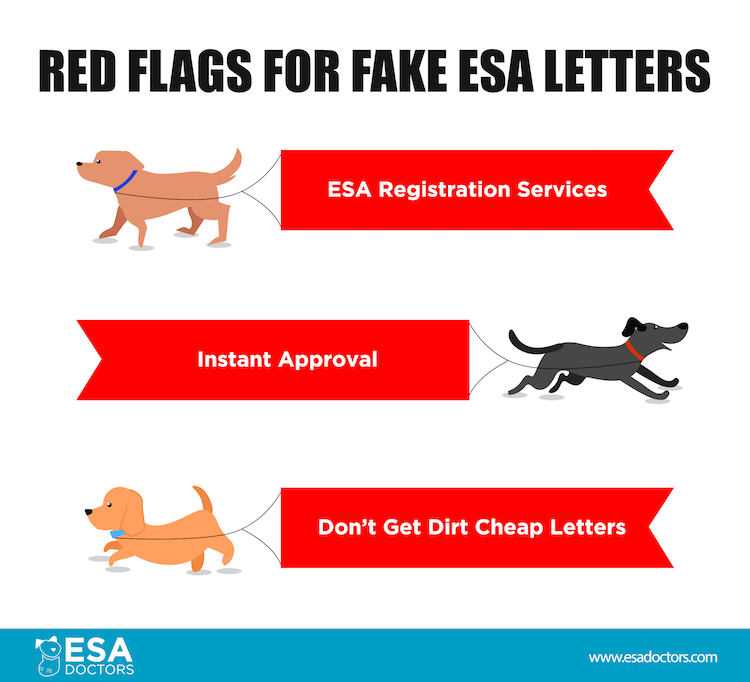Florida recently passed new laws governing emotional support animals (ESA) which go into effect on July 1, 2020. These new laws clarify how residents of Florida can properly qualify for an emotional support animal and affirm the special rights ESA owners have. These rules were also intended to address a growing concern that tenants are purchasing illegitimate documentation for emotional support animals and wrongly passing off their pets as emotional support animals. The new rules set forth how tenants can obtain effective ESA documentation, including through a telehealth provider.
In this article, we will summarize key points from the new Florida emotional support animal law and examine what steps current and prospective ESA owners should take in order to comply. Under the new law, residents of Florida who falsely claim their pet is an emotional support animal without following the correct procedures may be subject to legal liability and penalties. Now more than ever, it is important to understand your rights as an ESA owner and obtain your ESA documentation from a reputable source.
If you’re looking to qualify for ESA documentation in Florida, ESA Doctors can help connect you to a licensed health care professional that can assess whether an emotional support animal is right for you.
Protections for Florida Tenants who Own Emotional Support Animals
The new rules in Florida are similar in many ways to Federal Fair Housing rules for emotional support animals and borrow many of the same concepts. An emotional support animal in Florida is an animal that provides assistance or therapeutic emotional support to its owner by its mere presence. An ESA does not need any special training to work or perform tasks for its owner.
Florida’s laws prohibit housing providers from discriminating against tenants with a need for an emotional support animal. ESA owners are allowed to live with their animal companions as “reasonable accommodation”, even in buildings that generally prohibit pets. Landlords are also not permitted to charge extra compensation for allowing the animal, meaning they cannot charge a fee or pet deposit for ESAs.
Housing providers in Florida must generally accept a valid request from a tenant to live with their emotional support animal, with certain exceptions. A landlord can deny a reasonable accommodation request for an ESA that poses a direct threat to the health or safety of others or poses a direct threat of damage to property, but only if those threats cannot be reduced or eliminated by another reasonable accommodation.

How to Qualify for an Emotional Support Animal in Florida
Qualifying for an emotional support animal under Florida law is similar to the procedure under federal Fair Housing rules. Generally, owners of emotional support animals have invisible disabilities such as depression, anxiety, PTSD or phobias. A tenant can prove that they have a disability related need for an emotional support animal by submitting an ESA recommendation letter from a licensed health care practitioner to their landlord.
A wide range of health care practitioners are permitted to provide ESA letters in Florida, including:
- psychologists
- mental health counselors
- marriage and family therapists
- social workers
- psychiatrists
- doctors
- registered nurses
- and other licensed professionals.
Telehealth providers who provide their services remotely are also permitted to provide ESA documentation.
In addition to being allowed to ask for an ESA letter from a licensed provider, landlords are also permitted to request proof of compliance with state and local requirements for licensing and vaccination of the ESA. An emotional support animal is not exempt from general licensing and vaccination rules that generally apply to all animals in the tenant’s jurisdiction.
Similar to Fair Housing rules, owners with emotional support animals have certain rights to privacy when it comes to sensitive, confidential details about their medical condition. Landlords are not permitted:
- to request information that details the diagnosis or severity of the tenant’s disability, and
- they cannot request any medical records relating to the tenant’s disability.
The new rules in Florida also address landlords that create unnecessary barriers for tenants who request ESA accommodation. Under the new rules, housing providers cannot require the use of a specific form or a notarized document. Landlords also cannot deny an ESA request solely because the tenant did not follow the landlord’s routine procedure for ESA accommodations.
That means that landlords must consider an ESA request if the tenant submits valid ESA documentation from their health care practitioner. They cannot further insist that the tenant submit additional forms or follow a different procedure if the tenant has otherwise complied with ESA rules.

Invalid Forms of ESA Documentation in Florida
Like the recent guidelines issued by the U.S. Department of Housing, the new law in Florida attempts to curb the spread of inadequate forms of ESA documentation. In Florida, registrations, identification cards, patches, certificates or similar registrations obtained online will not by themselves be sufficient to establish the tenant has a disability-related need for an emotional support animal.
Florida’s ESA rules make clear that in order to have a valid emotional support animal, the tenant must possess documentation from a licensed health care practitioner.
All prospective ESA owners should understand that a mere certificate, ID or registration bought online will not be enough to properly qualify their animal companion as an ESA.
If you do not currently have a licensed health care professional familiar with your mental health, or you are having difficulty finding one, ESA Doctors can help connect you to a licensed practitioner. The practitioners we work with are licensed professionals who are knowledgeable about emotional support animals. They can help evaluate whether an ESA is right for you and, if you qualify, can provide you with documentation to submit to your landlord.

Consequences for Faking the Need for an Emotional Support Animal
In Florida, it is now more important than ever to ensure that your ESA documentation is from a licensed health care practitioner. The new law in Florida contains penalties for tenants who knowingly provide fraudulent documentation for an emotional support animal. Providing fake documentation in Florida is punishable as a misdemeanor offense.
It is never a good idea under any circumstance to provide fake documents for an emotional support animal. Misrepresenting your pet as an assistance animal is unethical and harms the reputation of the community of emotional support animal owners who obtain their documents from reliable sources. In Florida, presenting illegitimate ESA documentation may now result in potential legal consequences as well.
If you are interested in qualifying for an emotional support animal in Florida, make sure you are being evaluated by a licensed health care professional. The new rules in Florida make clear that solely presenting a certification, registration or ID is not sufficient to qualify an emotional support animal. It is important for ESA owners to be aware that these documents and accessories are not enough to make a valid claim for reasonable accommodation of an ESA.
Current and prospective ESA owners in Florida should possess a valid ESA recommendation letter from a licensed professional before requesting ESA accommodation from their housing provider. If you are interested in qualifying for an ESA in Florida, ESA Doctors can help connect you to a licensed healthcare professional that is knowledgeable about emotional support animals.
Improve your life. Connect with a Licensed Health Care Professional now.








I have a Pitbull that I am getting ESA certified due to my depression. She is by far the best dog I have ever had. However I am possibly having to move soon and one place doesn’t allow pitbulls how does this work? Also, because it will be my first house I am concerned about house insurance as I know a lot of insurance companies won’t cover for certain breeds. I just want to make sure I go about everything the correct and legal route. Thanks
Under Fair Housing rules, landlords are not permitted to reject an emotional support animal solely because it is a certain breed.
We are supposed to close on a condo this Wednesday. I did everything I needed to do for my 70 lb boxador to make her my emotional support animal and had not thought to bring anything up about my 14 lb cat because they allowed pets under 25 lb and there was nothing specified about a pet limit. Now they are telling me that there is a 1 pet limit and not allowing the cat. Are there any laws against this, please? Thankyou so much.
ESAs are not considered pets under Fair Housing rules, they are assistance animals and are exempt from rules that apply to pets.
A new tenant moving in Oct 1st, provides an ESA letter to me today Oct. 5th. The house was listed as no pets. The ESA letter is dated Sept 21st, allowing 3 cats (which already have names) as ESA animals. Is this not fraudulent by not being upfront before the lease was signed? And for multiple animals??
Your tenant should have been more upfront about their ESA situation. Multiple ESAs are allowed as long as each ESA is recommended by a licensed healthcare professional. Under Fair Housing rules, landlords still have to consider an ESA request even if it comes after the tenant has moved in. ESAs can be rejected if they would create a safety or health issue.
@Jeannie
An ESA is not considered a ‘PET’ as you claim under Law. Even if you say ‘No Pets’, the tenant, with a valid licensed healthcare professionals approval, can have an ESA. Your question of ‘should they have been more upfront’, perhaps they should have, but not anymore than a person with any other kind of disability. If you would’ve known ahead of time and said ‘no’ to them, you would have subjected yourself to LEGAL liability for Discrimination. You can still be subject to legal liability should the tenant have proper licensed healthcare professional documentation for all ESA’s, and you attempt to reject them for anything other than saftey or health. Even then, you must prove that the tenant could not resolve those issues.
We are resigning a lease for a second year at our current home in FL. When we first moved in we provided all necessary documents for our ESA animal. Now that we are signing for a second year the HOA is requesting that we requalify for our ESA. They want all the documents again. While obviously unnecessary are they allowed to deny us at this point? Are we required to show proof again?
ESA letters technically do not expire under Fair Housing rules, but many landlords will want a letter that is more current than a year on file.
In communities where dogs 35lbs. and Under ARE Permitted – Would an 80lb. Dog be permissible as an ESA under this new Law?
Weight and breed restrictions do not apply to emotional support animals, as long as they do not pose a safety or health issue.
If my apartment complex asked me to allow a release of medical info to them and then proceeded to contact my doctor and have her fill out their own ESA form, is this still allowed?
My doctor had already written an ESA note, and I submitted it to the apartment management. After they contacted my doctor, they denied my esa and stated that I was not deemed “disabled enough for accomodations.” Do you think I can refute/appeal this?
Landlords are NOT allowed to request medical information regarding a tenant or require that their doctor or therapist fill out a special form.
Is there a requirement in FSS that ESA letters are to be renewed annually or ever?
We think you’ll find this article helpful: https://esadoctors.com/do-esa-letters-expire-how-to-renew/
I work for a vacation rental. Some units are homes that the owners live in part of the year. Some have severe allergies therefore have their units as non pet friendly. What can we as company require for emotional support animals only since people do use this excuse and have fake certificates. Can we ask for the certificate and charge a pet fee?
You can ask to see an ESA letter from a licensed healthcare professional. You are not allowed to charge pet fees or deposits for ESAs.
If I received my ESA letter in California and move to Florida, will the Florida housing accept my California ESA letter?
Most landlords are understanding of tenants who have recently moved and have a letter from a therapist from their home state.
Do these rules pertain to condominiums where the occupant is an owner?
ESA rules apply to condos.
Can my landlord refuse to renew my lease if I get a ESA?
If a landlord cancelled a tenant’s lease solely due to the fact they had an ESA, that could be considered discriminatory.